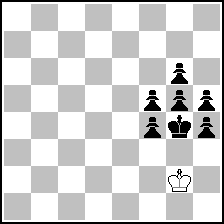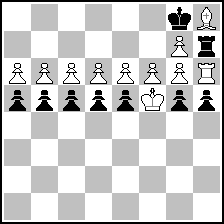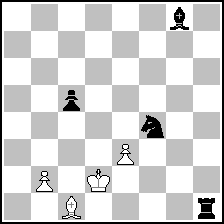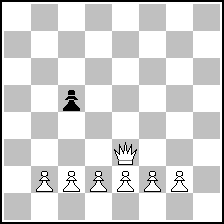|
| Page: [Previous] [Next] 1 2 |
| (1) Posted by seetharaman kalyan [Saturday, Nov 10, 2012 04:02] |
Illegal Cluster ... Have fun !
Have a go and have fun in trying this simple construction task of Illegal Cluster!
http://juliasfairies.com/problems/page-101/#No.166
|
|
| (2) Posted by Ian Shanahan [Saturday, Nov 10, 2012 04:59] |
I published an Illegal Cluster not unlike this - but no anticipation! - in the Retros column of "The Problemist", September 2012, for anybody interested.
|
|
| (3) Posted by seetharaman kalyan [Saturday, Nov 10, 2012 20:16]; edited by seetharaman kalyan [12-11-10] |
Thanks for pointing it out! I missed it. For those who dont have the Problemist issue:
Diagram position: bKa2 & wKc2.
Add bP, bS & bR to create an Illegal cluster. (a) Diagram (b/c/d) bK b5/e4/e1.
Nice solutions !
I too tried for a fourth twin with only one change, but was unsuccessful ! Mine was inspired by a different problem which also had only Kings on board.
|
|
| (4) Posted by Dan Meinking [Sunday, Nov 11, 2012 17:02] |
Seetharaman:
Does the (b) twin really require TWO black units? Or did you stipulate that for consistency?
In any case your problem is very similar to my all-time favorite IC:
Jorge J. Lois
4th Commendation
feenschach 1976
dedicated to Peter Kniest
 (= 1+2 ) (= 1+2 )
The PDB entry (P0002716) stipulates 5 twins, but I prefer the form:
Add bP bP and a white unit for IC, 5 solutions!
|
|
| (5) Posted by seetharaman kalyan [Sunday, Nov 11, 2012 18:38] |
Thanks Dan for showing the Lois problem. Mine was inspired by this problem only. First time I attempted an Illegal Cluster.
You are right. In twin (b) there can be position adding a wB and bS alone. But I attempted to make a five part problem with only one change between each twin. But was unsuccessful ! Settled for for more than one change between parts.
|
|
| (6) Posted by Rajendiran Raju [Tuesday, Nov 13, 2012 07:17] |
@ Raman
i need Solution for Jorge Lois Problem .
|
|
| (7) Posted by Dan Meinking [Tuesday, Nov 13, 2012 08:10] |
The Lois problem (with solutions) can be found here:
http://www.softdecc.com/pdb/search.pdb?expression=PROBID=%27P0002716%27
|
|
| (8) Posted by Rajendiran Raju [Tuesday, Nov 13, 2012 11:26] |
Thank you Very Much Mr.Dan Meinking & also for My Dear Mr.Kalyan Seetharaman Posting this
intresting Illegal Cluster .
|
|
| (9) Posted by Mario Richter [Wednesday, Nov 14, 2012 11:25] |
QUOTE
In twin (b) there can be position adding a wB and bS alone
Adding only two pieces of different color to the bare kings is usually not a good idea, because it leads to trivial cooks: most positions with both kings in check then are ICs ...
|
|
| (10) Posted by seetharaman kalyan [Wednesday, Nov 14, 2012 13:23]; edited by seetharaman kalyan [12-11-14] |
I agree Mr.Mario ! I think 3 is the minimum which will lead to more unique positions. Any way everyone will agree that adding more pieces is the real fun and difficulty ! In response to my challenge I have received From Alex Levit, an Illegal cluster adding 11 pieces. So this is the number to be beaten !
|
|
| (11) Posted by Mario Richter [Friday, Nov 23, 2012 08:36] |
QUOTE
Any way everyone will agree that adding more pieces is the real fun and difficulty
Wolfgang Dittmann discusses this question at some length in his book "Der Blick zurück" (p.178ff).
As an example he gives
Thomas R. Dawson
The Problemist, Fairy Chess Suppl. 1933
 (= 2+1 ) (= 2+1 )
Add 6 black pawns for an Illegal Cluster
and
Charles M. Fox
The Problemist, Fairy Chess Suppl. 1933
 (= 1+7 ) (= 1+7 )
Add 1 black bishop for an Illegal Cluster
and asks: "In Dawson's problem, 6 pieces have to be added, in Fox's problem only one. Is the latter therefore weaker?"
|
|
| (12) Posted by seetharaman kalyan [Friday, Nov 23, 2012 13:24]; edited by seetharaman kalyan [12-11-23] |
Thanks Mario Richter for quoting these two problems. Indeed the C.M.Fox problem is very nice and intriguing. I am still trying to solve TRD's problem !
What I meant was that it is probably challenging to construct Illegal Clusters with more number of pieces on the board (not necessarily the added pieces).
Even on this point I may be wrong, as I am a beginner in the Retro or the IC field. My challenge was intended for composers to have fun ! I am happy that many have shown interest.
|
|
| (13) Posted by seetharaman kalyan [Wednesday, Nov 28, 2012 18:34]; edited by seetharaman kalyan [12-11-28] |
Thanks for the nice efforts from Alex Levit, Vlaicu Crisan, Thomas Brand and Mario Richter !
I think it will be impossible to check the alternate settings! So I am no longer insisting on Unique setting. Any sound setting with maximum number of pieces will be welcome ! I am just curious and eager to know the limit ! Best wishes !
|
|
| (14) Posted by seetharaman kalyan [Friday, Dec 14, 2012 05:12] |
Accepting the challenge Vlaicu Crisan (Romania), Alex Levit (Russia, Peitro Pitton (Italy), Themistoklis Argirakopoulos (Greece), Mario Richter and Thomas Brand (both of Germany) tried their hand at making a heavy Illegal Cluster. I had fun looking at their very interesting ideas and constructions. Mr.Vlaicu's setting below was the most interesting.
--- Add 18 pieces: 8 WPs, WR, WB, 7 bPs & one WR.
 (= 11+9 ) (= 11+9 )
The other nice settings and my comments based on the author's explanations are here:
http://juliasfairies.com/wp-content/uploads/2012/12/Response-to-Illegal-Cluster-Problem.pdf
So the interesting question is : Irrespective of the King positions, What is the heaviest Illegal Cluster you know ?
|
|
| (15) Posted by Ian Shanahan [Friday, Dec 14, 2012 06:49] |
Here's a nice one by Dmitri Baibikov in the PDB: P1204456. His P1070089 (adding 12 men) is, sadly, cooked.
|
|
| (16) Posted by Mario Richter [Friday, Dec 14, 2012 07:00] |
Vlaicu's contribution fits well to the conditions, that you have established for this little contest.
But to be honest, I stopped my own activities immediately after I read that you have lifted the constraints regarding the uniqueness requirements, simply because with this new conditions the challenge had become uninteresting for me.
The reason: positions with what you call "alternative settings" are *NOT* Illegal Clusters - the uniqueness requirement is a constitutional and essential part of the definition of problems of the type "Illegal Cluster".
Assuring thé uniqueness is the difficult part in constructing an IC, and proving its correctness is nearly impossible, especially if many pieces have to be added.
But that's exactly the intellectual challenge, which makes it so pleasing to deal with ICs.
|
|
| (17) Posted by Mario Richter [Friday, Dec 14, 2012 07:22] |
The twinnings both in Ian's as well as in the Lois-problem are nice, but from a retroanalytical standpoint both they as well as the Dawson and the Fox problem I've quoted are merely harmless jokes.
If someone likes a real challenge, then he should try to solve one of my favourite ICs:
Wolfgang Dittmann
Die Schwalbe 1976
104 Der Blick zurück 2006
Lob Karl-Fabel-Gedenkturnier
 (= 4+4 ) (= 4+4 )
Ergänze sK, sD, sL, sL, sB, sB zu einem IC!
Add  , ,  , ,   , ,   for an IC. for an IC.
Only 6 pieces to be added, this is far away from the record established by Hans Heinrich Schmitz (24 pieces to be added, s. http://www.softdecc.de/pdb/search.jsp?expression=PROBID='P0001751'), but (at least for me) the Dittmann-problem was much more challenging than the Schmitz one.
|
|
| (18) Posted by seetharaman kalyan [Friday, Dec 14, 2012 11:28] |
Thanks for quoting Schmitz problem. So the absolute maximum record (for the heaviest IC) has been already achieved! I think this should have been difficult to solve, though retro part is straightforward!
|
|
| (19) Posted by Juraj Lörinc [Friday, Dec 14, 2012 14:46] |
I think it is important to distinguish between illegal cluster (IC) as position (with specific properties) and IC as a problem stipulation (as it is usually understood).
IC as a problem stipulation usually asks for adding somehow defined material to the diagram position to reach IC as position. All solutions of IC problem are thus ICs as positions, both intended solutions and cooks.
Of course, I agree the assuring the uniqueness of IC solutions is the difficult part in constructing an IC problems, however this does not mean that IC positions even without adding anything are automatically without interest for everybody. Does anybody by chance know about retro problem with stipulation "IC?" where the position would be provided and it would be solver's task to prove that the position is IC. This might carry enough retro content after all, or not?
|
|
| (20) Posted by Kevin Begley [Friday, Dec 14, 2012 20:12]; edited by Kevin Begley [12-12-14] |
The "IC?" stipulation is generally much weaker than might be imagined -- even for fairy chess.
When possible, it is more interesting to turn this stipulation on its head, and stipulate: "add some set of units, to obtain an illegal position" -- ignoring whether the position realized proves to be a cluster.
For example, consider:
Kevin Begley
Alan McCormick
eteroscacco 2009
 (= 7+1 ) (= 7+1 )
Atomic (checkfree)
Alan and I might have chosen to drop a King (of a specific color) onto a specific square, and stipulate: "IC?"
The answer (which could be yes!) might even prove mildly surprising.
But, we turned this around, and instead stipulated: "Add a King (of some color) to obtain an illegal (final) position."
Disclaimer: it must be conceded that, in checkfree variants, illegal clusters become almost an absurd challenge (suggesting that "IC" may not be well defined, for cases where Kings might be legally removed).
Atomic (checkfree) - Any capture also annihilates the capturing unit (this would include Kings and pawns!), plus any officers (including Kings, but NOT pawns!) on the 8 squares adjacent to the arrival square of the capturing unit (ground zero for en passant captures is thus the 3rd/6th ranks).
There is no chain reaction -- only direct capture (not annihilation) detonates the atomic explosion.
There is no check (or checkmate) -- win by annihilating your opponent's King, without simultaneously causing the annihilation of your own.
|
|
Read more... |
Page: [Previous] [Next] 1 2
MatPlus.Net  Forum Forum  Competitions Competitions  Illegal Cluster ... Have fun ! Illegal Cluster ... Have fun ! |
 ISC 2024
ISC 2024 Forum
Forum  Competitions
Competitions  Illegal Cluster ... Have fun !
Illegal Cluster ... Have fun ! 


